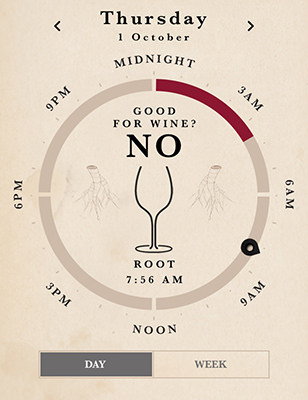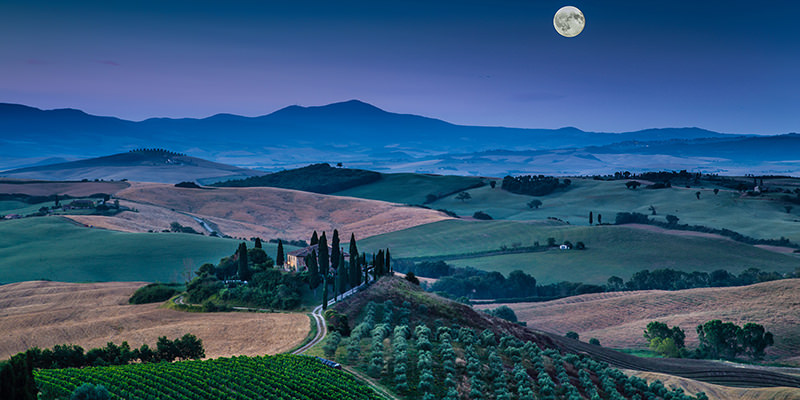Biodynamics has a large tribe of devout followers, and an equally large band of skeptics. Believers bury horns of manure in their vineyards (or feed their babies bizarre milk blends) while most of the world roll their eyes.
Since its inception in the 1920s, the moon-centric science preached by Austrian Rudolph Steiner has been divisive at best. In essence, Steiner preached the gospel of living and farming with the earth and its movements, as opposed to using a purely scientific, nutrient-based approach. Biodynamic farmers and vintners refrain from using any chemical pesticides in the vineyard and winery, and adhere to strict regulations for common additives like sulfur and fining agents.
The official definition of the science, according to the Biodynamic Farming and Gardening Association is “a spiritual-ethical-ecological approach to agriculture, gardens, food production and nutrition.” Like fine tuning a radio, biodynamic farmers go beyond organics and strive to have vines growing in tune with the cosmos, by coordinating their soil treatments with the lunar calendar. The basic idea is that plants are more receptive to certain practices such as fertilizing or pruning on particular days or phases of the moon. (Like how a shopping spree always sounds better on pay day).
Don't Miss A Drop
Get the latest in beer, wine, and cocktail culture sent straight to your inbox.Followers of biodynamic farming go beyond using organic fertilizers–they combat powdering mildew with tea made from stinging nettles, and spread compost during ascending moons. But the most interesting element of biodynamics is that the beliefs don’t end in the field. Winemakers and gardeners alike believe the results of biodynamics extend right into your wineglass, thanks to the moon.
The lunar calendar categorizes days into four groups–flower, fruit, leaf, and root–based on where the moon is in accordance with various constellations. For example, fruit days occur when the moon is in any of the fire signs, like Sagittarius or Aries. Each day is optimal for various plants or procedures; for example it’s best to harvest radishes on a root day since radishes are a root.
If you’re already drinking the biodynamic Kool-Aid, this reasoning makes a lot of sense when it comes to vino: wine tastes better on “fruit” days, because it comes from grapes, and grapes are a fruit.
Supporters of biodynamics claim wine drinkers experience this phenomenon regularly–ever gone wine tasting and felt like everything tasted amazing? Had other nights where even favorite bottles fall flat? Proponents argue those are the palatable differences between root and fruit days.
 There are even apps to help mere mortals drink at the right times. “When Wine” and “Bio Garden,” both free on iPhone, track the lunar calendar and use a wine glass or smiling grape emojis to recommend the best times for wine drinking. The paid version of When Wine provides the lunar calendar for an entire year, so drinkers can decide when to open special bottles, or know when to opt for water.
There are even apps to help mere mortals drink at the right times. “When Wine” and “Bio Garden,” both free on iPhone, track the lunar calendar and use a wine glass or smiling grape emojis to recommend the best times for wine drinking. The paid version of When Wine provides the lunar calendar for an entire year, so drinkers can decide when to open special bottles, or know when to opt for water.
Like a religion, there are degrees of devotion to these methods. Famed Loire Producer Nicolas Joly is known for refusing to open his wines on root days. Buyers at UK wine giant Tesco organize their tastings around the lunar calendar. Other producers simply cultivate pesticide free environments and utilize only living, natural fertilizers. Still others merely acknowledge that if the moon is strong enough to generate ocean tides, it could be strong enough to influence taste.
On the other hand, nonbelievers argue that wines can taste differently for a myriad of reasons, both scientific and psychological. Has the bottle been open for 3 minutes, 3 hours, or 3 days? Was it made by a famed producer–suggesting it should taste glorious even before its opened? Who’s tasting–best friends or frustrated coworkers?
For every biodynamic devotee, there seem to be four farmers or tasters who remain unchanged by attempts to decipher the interstellar impacts on wines and tastebuds. For the undecided, perhaps the only way to determine if the lunar calendar affects tastebuds is to drink up, and drink up often.

